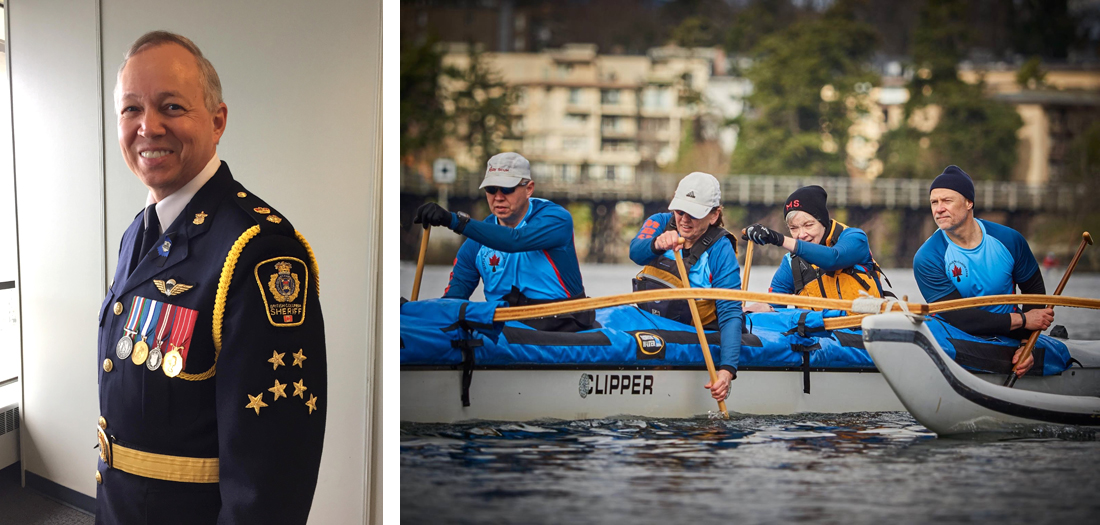Soldier On sailor sets course for tranquility
By Lookout on May 23, 2018 with Comments 0

Left: CWO (ret’d) Darcy Eggleston in his BC Sherriff’s Superintendent dress tunic and service medals. Right: Eggleston (left) paddles with his Maple Bay Ocean Canoe Club outrigger team during a March 4, 2017 race on the Gorge Waterway.
Peter Mallett, Staff Writer ~
Despite being in the army for 22 years, Warrant Officer (retired) Darcy Eggleston is proving he’s as at home on the water as any seasoned sailor.
The former military policeman has spent much of the past four years on the water to help manage PTSD symptoms he suffers following events he witnessed during peace keeping and overseas missions in the 1980s and 1990s.
This week Eggleston will step up his water therapy another notch. He’ll be learning to sail in preparation for the Swiftsure Yacht Race. He and three other members of the Soldier On Program are part of Her Majesty’s Sail Training Vessel Goldcrest’s racing team for the annual event.
Soldier On, a Joint-Personnel Support Unit-run program, provides athletic and recreational opportunities for ill and injured serving and retired personnel to assist in their recovery process.
“The therapy for me is getting out on the water and the open ocean with its rolling waves. It has a calming effect on me,” said Eggleston who now works as the Vancouver Island Superintendent with the B.C. Sherriff Service.
Eggleston, 58, was diagnosed with Post-Traumatic Stress Disorder two years ago and says the sport of paddling has proved to be a sure-fire remedy for him. He’s convinced that introducing the new challenge of sailing into his life will help him continue to plot a course to better health.
“Even before I had been officially diagnosed [with PTSD] I found that being out on the water in a boat calmed me and gave me a better sense of trust from being part of a team,” he said.
He is currently involved in one local dragon boat racing team and two outrigger teams, spending up to four days a week on the water, plus time in the weight room.
Eggleston now has a bright outlook on life, but before he found ways to manage his PTSD symptoms, there were many dark days.
After his departure from the military in 2001, he says his PTSD symptoms began to heighten. He suffered from rising anxiety levels, weight gain, sleep loss and excessive drinking. In 2015, things got so bad for a while that he even walked away from dragon boat paddling, which had been a central activity in his life.
“I knew there was something wrong and it was affecting my daily life,” he said.
The symptoms, he says, stem from multiple traumatic events he witnessed during his years as a peace officer. But one tragic event he experienced in Syria stands out more than the others and often triggers his PTSD symptoms, he says.
Eggleston was in close proximity to a horrific car bomb explosion while posted to the Canadian Embassy in Damascus between 1995 and 1999. As a result, any loud noise he hears can trigger his PTSD.
In the days and months following that deployment to Syria, Eggleston could feel something was wrong, but his commanding officers were unaware of his health problems.
“When the military asked me if I wanted to take part in a peace keeping mission in the Golan Heights and then later insisted, I said to myself, ‘That’s it! I’m getting out of the military,’ and I left the organization while I was at the top of my profession.”
In subsequent years, his PTSD symptoms worsened and began to affect his job and personal life. In 2016, he sought the help of a therapist who told him he had two options for recovery: “A healthier and more active lifestyle or go on medication.”
Eggleston says he had no hesitation in selecting the activity option over the pharmaceutical path. He decided that dragon boat paddling was the perfect medicine for him and got back on the water shortly after that conversation. He then learned about the Soldier On program in 2017 and how it managed Canada’s Invictus Games team.
Eggleston was one of more than 700 paddlers who late last year applied to be part of Canada’s 2018 team, which will compete in Sydney, Australia, later this year. He found out in February that he wasn’t one of the 40 members selected, but received an intriguing offer from the organization in March.
He was selected as a member of the Goldcrest Swiftsure team and would have the opportunity to learn about the sport of sailing for the first time. Although he has previous experience with the forces at play in the Strait of Juan de Fuca through other boating activities, they didn’t come on a 36-foot yacht like the Goldcrest.
“Sailing is something new and much of it is something completely foreign to me because I’ve never handled sails or a line,” he said. “With dragon boat racing, and especially outrigging, you feel the winds and the tides by using your paddling strength, but with sailing it’s the physics of the wind and the sails.”
To learn the ropes prior to the race, he and his three Soldier On teammates will join up with the rest of the team, which comes from Naval Fleet School Pacific. From Tuesday to Friday this week, the Goldcrest team will use the docks at fleet school as its base while taking to the waters of Esquimalt Harbour for daily training sessions aboard Goldcrest.
Their efforts will be put to the test on May 26 when they make the 106-nautical-mile journey, beginning and ending at the Royal Victoria Yacht Club with a turnaround point at Cape Flattery, Washington.
“It’s a new challenge for me. I’ve done sky diving, scuba diving, and for me sports are all part of an adrenaline rush,” he said. “Taking part in sports like these relieves my anxiety and gives me a sense of control over things.”
Filed Under: Top Stories
About the Author:





